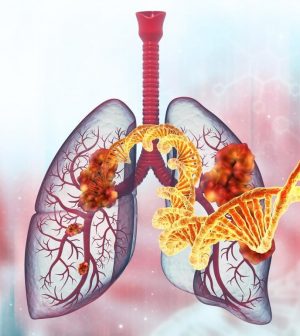- Could Your Grocery Store Meat Be Causing Recurring UTIs?
- Are You Making This Expensive Thermostat Error This Winter?
- Recognizing the Signs of Hypothyroidism
- 10 Strategies to Overcome Insomnia
- Could Artificial Sweeteners Be Aging the Brain Faster?
- Techniques for Soothing Your Nervous System
- Does the Water in Your House Smell Funny? Here’s Why
- Can a Daily Dose of Apple Cider Vinegar Actually Aid Weight Loss?
- 6 Health Beverages That Can Actually Spike Your Blood Sugar
- Treatment Options for Social Anxiety Disorder
Why Does Cancer Spread to the Lungs So Often?

The lungs are a tempting place for cancer cells — so much so that more than half of people with advanced cancer elsewhere in their bodies wind up with lung tumors.
Researchers now think they know why.
Elevated levels of an amino acid called aspartate appear to allow cancer cells to grow more easily inside the lungs, researchers reported in a study published Jan. 1 in the journal Nature.
“We found high levels of aspartate in the lungs of mice and patients with breast cancer compared to mice and patients without cancer, which suggests that aspartate may be important for lung metastasis,” lead researcher Ginevra Doglioni, a doctoral student with the Flemish Institute for Biotechnology’s Center for Cancer Biology in Belgium, said in a news release from the college.
For the study, researchers examined the genetic activity of tumor cells taken from aggressive lung cancers.
They found that aspartate — an amino acid used to make proteins in the body — appeared to trigger gene activity that results in higher cancer aggressiveness and more risk for lung tumors.
Aspartate appears in very low levels in the bloodstream, but it showed up in very high concentrations in the lungs of mice with advanced breast cancer, results show.
Researchers noted a similar process when examining human lung tumor samples, results show.
Essentially, aspartate activates a surface protein on cancer cells that results in a gene signaling cascade. This cascade of activity enhances the ability of cancer cells to alter their environment and make it more suitable for aggressive growth.
These findings could help doctors keep the lungs cancer-free, even in advanced cases where cancer is spreading to other parts of the body, researchers explained.
The research team also noted that drugs are already on the market that target the processes which appear to make lungs more cancer-prone.
“There are drugs available to target the mechanism we identified and thus with further research a translation toward a clinical setting might be possible,” senior researcher Sarah-Maria Fendt, a principal investigator with the Flemish Institute for Biotechnology’s Center for Cancer Biology, said in a news release.
More information
The National Cancer Institute has more on advanced cancer.
SOURCE: Flemish Institute for Biotechnology, news release, Jan. 2, 2025
Source: HealthDay
Copyright © 2026 HealthDay. All rights reserved.










